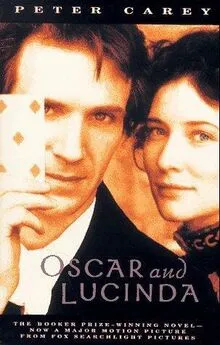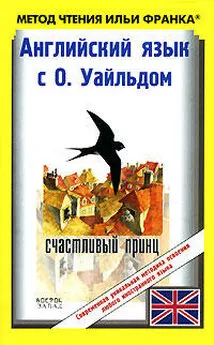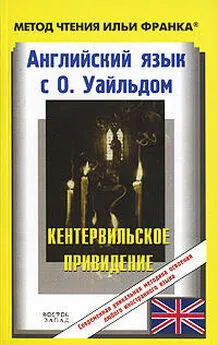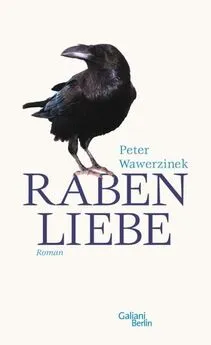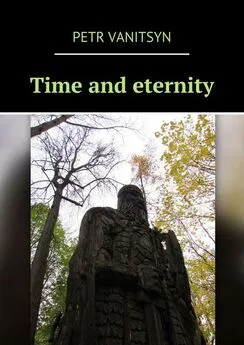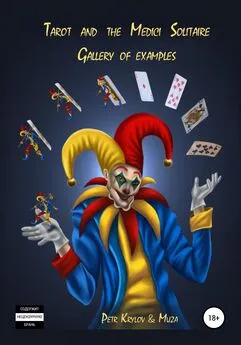Peter Carey - Oscar and Lucinda
- Название:Oscar and Lucinda
- Автор:
- Жанр:
- Издательство:Vintage Books
- Год:1988
- Город:New York
- ISBN:0-679-77750-4
- Рейтинг:
- Избранное:Добавить в избранное
-
Отзывы:
-
Ваша оценка:
Peter Carey - Oscar and Lucinda краткое содержание
The Booker Prize-winning novel-now a major motion picture from Fox Searchlight Pictures.
This sweeping, irrepressibly inventive novel, is a romance, but a romance of the sort that could only take place in nineteenth-century Australia. For only on that sprawling continent-a haven for misfits of both the animal and human kingdoms-could a nervous Anglican minister who gambles on the instructions of the Divine become allied with a teenaged heiress who buys a glassworks to help liberate her sex. And only the prodigious imagination of Peter Carey could implicate Oscar and Lucinda in a narrative of love and commerce, religion and colonialism, that culminates in a half-mad expedition to transport a glass church across the Outback.
Oscar and Lucinda - читать онлайн бесплатно полную версию (весь текст целиком)
Интервал:
Закладка:
When he cantered up the ridge towards Messrs Smith and Hopkins, he felt as fresh and clean as the morning he had left Port Jackson, felt
100
Oscar and Lucinda
far better, for on that occasion he had suffered a mild case of jitters, a looseness of the bowels which had been difficult to hide from men with a keen eye for weakness. Mr Smudge was "not talking" to him. So, he thought, we have our little tiff. And a smile, he could not help it, ruffled the smooth cloak of concern he had arranged on his handsome face. Mr Smudge had still not attended to his toilet. There was a sprinkling of ginger hair upon his chin and some black charcoal marks on his ears where he had been scratching his mosquito bites. He was a contrast to his cornpanion who was, as usual, neatly kitted out in fresh-washed twill and cotton. Yet you could not conclude from this that one had "character" whilst the other had not. They were a pair, in Jeffris's eyes, and he thought the "Ladies' Compartment" aptly named. Mr Jeffris had, perhaps, been too harsh with Mr Smudge. But the man was alive, was he not? He would be delivered as requested. He was not speared or poisoned by serpents. He had seen things no Sydney clerk would ever dream of seeing: life, death, savages. He had eaten snake and played the missionary. And now he should not be sitting on his car with his ramrod back, but should be throwing his hat in the air and offering to shout his protectors' drinks. They had guaranteed his place in history.
It was such a crisp, clear day and the ridge was almost as good as Her Majesty's highway. Mr Jeffris brought his stallion to a trot and rode beside the "Ladies' Compartment" for a piece. The view was splendid: the Bellinger estuary swept beneath them like an illustration to à fairy tale: strokes of aqua, gold, turquoise. Three pelicans thrust out their chests and glided on the air below.
"Well, Mr Hopkins," said Mr Jeffris, as he plucked a blood-bloated tick from his stallion's neck.
"What do you say to that?"
"To what?" the clergyman said abruptly, turning his haughty red face briefly towards his questioner before looking back again. Beside him, Mr Smith honed his axe, and hid his anger and self-loathing from
no one.
"What do you say," insisted Mr Jeffris, "to this, the countryside?"
"If it was my country, sir, I would be feared to see you coming." Mr Jeffris laughed, a harsh, impatient laugh.
"And I would pray to God to forgive you, and all of us who are of your party."
"It has been an education for you," said Mr Jeffris complacently. "That I can understand." Oscar said nothing. His anus itched beyond belief. He thought: If
400
Oscar at Bellinger Heads
I were a strong man I would leap on him now and commit the sin of murder.
"Churches are not carried by choirboys," said Mr Jeffris. "Neither has the Empire been built by angels," and he would have said more on the subject, for it was one he had a secret passion for, and his hand had just drifted to his broad moustache which he would stroke as he gathered in the strands of his defence, when he was interrupted by that bow-legged gentleman, the plant collector, who was, as usual, wanting to go cantering away from the main party, and wished to take the carpenter as "bodyguard." As it was Mr Jeffris's agreement that he had the rights of sale of all the plant collector's delicate drawings, he was more than pleased to humour him. The subjects of Empire and angels were forestalled by other calls on his attention, and finally he gave up. "We will drink," he shouted as he trotted back to settle some dispute that his brightly tattooed overseer was in the process of beginning. "We will drink champagne and send a message on the mail boat to Miss Leplastrier."
Oscar made a small noise, a little grunt of pain. In relationship to Miss Leplastrier, he felt only that he was a coward and complicitous in murder. As the wagon banged and thumped down the ridge into Bellingen Heads, its wooden brake squealing on the last steep drop, Oscar made a pair with his hunched and silent companion. He saw, in every blackened stump, every fallen log, in every shadow beneath a she-oak or turpentine, the same crumpled dark bodies, the frail and tender envelopes of human souls. He sought his laudanum. He imagined he could smell blood, and perhaps he could, for his own bandages were caked with it.
There were two taverns at Bellingen Heads and, discounting some grey neglected tents with dull, fat-leaved weeds growing along their perimeter drains, nothing else. The taverns faced each other across a sandy flat in the centre of which was a greenish-coloured waterhole surrounded by a ring of faeces. He and Mr Smith remained in their seat while the teams were unhitched and watered there, but when this lengthy business was at last completed Oscar climbed down.
"Come, Smith."
"Oh, God, man," said Percy Smith. "Surely you are not going to drink with them?" Oscar said: "I have already travelled with them."
Inside the tavern he placed his injured hands flat on a rough table. There was a smell here which was like a condensation of that slightly off odour, that blocked-drain smell which, mixed with salt air, was the
401
É
Oscar and Lucinda
distinctive odour of Sydney. There were small black flies everywhere. They climbed across his bandages, his face, across the lids of his eyes. He felt he had travelled to the very heart of New South Wales.
He did not wear his "uniform," but the shiny, frayed black suit he had worn as both clergyman and clerk. He had a collarless white shirt from which his long white neck sprouted to his staring crimson face and blooming ginger hair. He sat with his back very straight against the wall and held his hands together across his chest. He thought: I will smite them all. He trembled. He glared around the room at whiskered faces which not only stared back at him, but more often, laughed and pointed.
He said: "The pillars of society."
He thought: What would God have me do? He saw, in his mind, his father's face. He sighed. He was the subject of much curiosity. He himself felt only that he was in an evil place. He had no curiosity beyond that. Yet the little tavern was filled with curiosities. The bar was made from a single threefoot-wide plank of cedar. The walls had pennies and florins driven into place with six-inch nails. A couple seemed to be having sexual congress on the other side of the Tom curtain through which men — short, for the most part, broad and shovel-bearded, none of them too steady on their feet-would occasionally come and go.
While the day outside was clay-white, the inside was as dark and sooty as a painting above a fireplace. There was jostling going on around Mr Jeffris who seemed, in this environment, as white-skinned and genteel as an officer posing for his portrait.
The cedar cutters were insisting Jeffris must play cards with them. They spoke with humour, but if they were ready with a laugh and a wink they were also men whose faces spoke more of their cruelty and selfishness. These were faces that would "turn nasty" in a moment, and this information was, like a pitchfork, only partly hidden in the haystack of their laugh. Jeffris would be Captain Hackum if he had to, but he would not play them cards. He sent Moët et Chandon to Mr Hopkins's table and the blacksmith and the bugler to go and guard him. Oscar was unaware of all these currents. He was pressed by a crushing physical weight of evil. Mr Jeffris had been right: the Empire had not been built by choirboys. At that moment he was his father's son, and he would bring retribution on the wicked. He would burn the tavern down. It was this conflagration that gave his eyes their intensity. He did not wonder why
&m
Oscar at Bellingen Heads
anyone would drive a six-inch nail through the silver and copper images of the Queen but, rather, how one would leave them melted and twisted in the ash. His thoughts were of kindling, ashbuckets, Miss Leplastrier's fireplace. He had left his laudanum aboard the wagon. The blacksmith had signed the pledge and the bugler (who had only bugled once, as they crossed Sydney Harbour and had, for the rest, been called to obey the diverse and dangerous orders of Mr Jeffris), was of an age when he still cut himself with his razor and diluted his rum with lemonade. He was frightened, although not yet of anything in particular. The blacksmith was also nervous. The three did not speak to each other, but bunched, as you will see cattle in saleyards back their hindquarters against the rail until the auctioneer sends a rouster to prod them with his rod and make them run and skip and shit themselves before the buyers and sellers and those cagey souls who will not sell their stock until next week.
Mr Jeffris then excused his not playing poker on the grounds that, "This gentleman over here is a sky-pilot and it would cause him offence."
It is possible that Mr Jeffris was unaware of the degree to which the cloth was despised in that part of the country. He could not have known that Dennis Hasset's predecessor had drowned after being thrown in the Bellinger.
Oscar sat in the cold sticky envelope of his dirty skin and sipped his tepid champagne. Such was his disturbed state that he was not displeased to feel the heat of the cedar cutters' animus. He watched, and was watched. He had a nagging pain around his eyes that would only be cured by laudanum.
He was invited to step through the Tom curtain and "dip your wee white toe in the holy well." Several glasses of dark liquor were delivered by the publican's pale and pimple-faced wife with
"the compliments of Sir Roger Rogerer" or "Lord Pupslaughter," each glass being placed on Oscar's table in reverent silence, each announcement of the glass's donor being greeted with inordinate laughing and whistling.
You could feel the atmosphere becoming overloaded and had the tavern been a living organism it would soon have suffered a shiver of retro-peristalsis and spewed its poisonous contents out into the green shit-littered waterhole. But the tavern was inert, constructed from twofoot-diameter posts of Bellinger River turpentine, these being buried four feet down in the sandy soil. Mr Jeffris had not come this far to die in a tavern brawl. He fiddled with his sword hilt. The publican picked up a claw hammer and was
Ani
Oscar and Lucinda
smacking its heavy head into the fleshy palm of his large hand. It was then-at the moment when everyone seemed to have focused on this hammer-that Oscar felt himself rising to his feet. He had not planned to. It was as if the pressure of his outrage could no longer be accommodated by the bent pipe of his body. He rose without a plan, but with the clear knowledge that retribution must be meted out to these blasphemers. He could not stand straight, but at an angle, and thus must prop his long arms out on the table.
There was a silence in the tavern. A woman was crying softly on the other side of the Tom curtain.
Oscar thought: What would God have me do?
Everyone seemed to move and breathe very slowly. A freakishly large red-bearded man raised a glass to his glistening lips. Oscar thought: Like the hand of a clock. He held up his own hand. He watched, as they watched, as his wrist emerged-a living thing-from the frayed shell of his sleeve.
Читать дальшеИнтервал:
Закладка:
